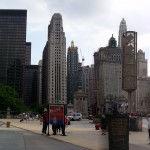I sought to find again in reality, I cherished as though for their poetic beauty, the broken gestures of the knives still lying across one another, the swollen convexity of a discarded napkin into which the Sun introduced a patch of yellow velvet, the half empty glass which thus showed to greater advantage the noble sweep of its curved sides and, in the heart of its translucent crystal, clear as frozen daylight, some dregs of wine, dark but glittering with reflected lights, the displacement of solid objects, the transmutation of liquids by the effect of light and shade, the shifting colors of the plums which passed from green to blue to golden yellow in the half-plundered dish, the promenade of the antiquated chairs that came twice daily to take their places round the white cloth spread on the table as on an altar at which were celebrated the rites of the palate, and where in the hollows of the oyster-shells a few drops of lustral water had remained as in tiny holy-water stoups of stone; I tried to find beauty there where I had never imagined before that it could exist, in the most ordinary things, in the profundities of "still life."
-From "In search of lost time", v.2









